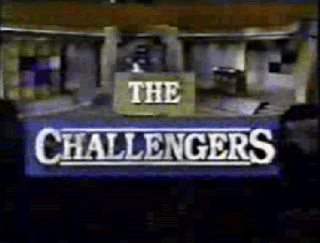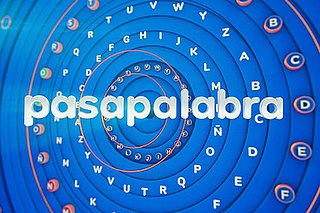Related Research Articles

Russian Roulette is an American game show created and executive produced by Gunnar Wetterberg that ran for two seasons on Game Show Network from June 3, 2002, to June 13, 2003. The show was hosted by Mark L. Walberg and announced by Burton Richardson.
The Joker's Wild is an American television game show that aired at different times between 1972 and 2019. Contestants answer trivia questions based on categories determined randomly by a mechanism resembling a slot machine. The show's title refers to the game's slot-machine mechanism also having jokers, which may be used to represent any category.

Chain Reaction is an American television game show created by Bob Stewart, in which players compete to form chains composed of two-word phrases.

The Challengers is an American game show that aired in syndication during the 1990-91 television season The series was created by Ron Greenberg and was based largely on his 1969 production, The Who, What, or Where Game. Dick Clark presided over the show with Don Morrow announcing. The Challengers was a joint production of Ron Greenberg Productions and Dick Clark Productions, with Buena Vista Television as distributor.
Time Machine is an American game show where contestants compete to answer trivia questions about popular culture and recent history to win prizes. The show aired on NBC from January 7 through April 26, 1985, and was hosted by John Davidson. Charlie Tuna was the announcer, with Rich Jeffries as his substitute. Reg Grundy Productions produced the series, and upon its premiere Time Machine was one of three Grundy series airing on NBC.

Game Ka Na Ba?, formerly Million-Million Na! Game Ka Na Ba?, Next Level Na! Game Ka Na Ba?, and Pilipinas Game Ka Na Ba is a Philippine television game show broadcast by ABS-CBN and Jeepney TV. Originally hosted by Kris Aquino, it aired on ABS-CBN's Primetime Bida line up from October 8, 2001 to February 27, 2004, and was replaced by Star Circle Quest. The show moved to the Bigtime Trio line up from November 15, 2004 to October 23, 2009, and was replaced by Showtime. The show was revived to Jeepney TV from October 12, 2020 to November 19, 2021 and on Kumu from February 19 to June 18, 2022. Robi Domingo serve as the final hosts.
Sale of the Century is an Australian prime time game show that aired on the Nine Network from 14 July 1980 to 29 November 2001. It is based on both Great Temptation that aired from 1970 to 1974 and on the original Sale that first aired in the United States from 1969 to 1973. The Australian format of Sale has since been used internationally, including in a revived US version that aired from 1983 to 1989.
Runway is a British game show that aired on ITV from 12 October 1987 to 19 February 1993 and was originally hosted by Chris Serle in 1987, then by Richard Madeley from 1988 to 1993.
My Kind of Music was a British game show that aired on ITV from 8 February 1998 to 29 March 2002 and is hosted by Michael Barrymore.

Three for the Money is an American game show produced by Stefan Hatos-Monty Hall Productions that aired on NBC from September 29 to November 28, 1975. Dick Enberg was the host with Jack Clark announcing. Enberg was also hosting Sports Challenge at the time and had just joined NBC's sports division.
Timekeepers is a British game show that aired on BBC1 from 3 January 1995 to 2 February 1996. It was hosted by Bill Dod.
Cleverdicks is a British television quiz show for Sky Atlantic, hosted by Ann Widdecombe. Running for 30 episodes, it was later repeated on Challenge. Four contestants competed in each episode for the right to call themselves "cleverdicks" and play for a roll-over cash jackpot. As explained by Widdecombe at the beginning of the first episode, a cleverdick is a person who is "irritatingly and ostentatiously knowledgeable or intelligent." The question material was therefore primarily academic in nature.
Face the Music is a weekly game show from New Zealand that aired on TV2 from 1992 to 1994, hosted by TV presenter Simon Barnett, along with Dwayne Francks as co-host. Jeoff Barraclough was the announcer as well as music coordinator.
Face the Clock is a game show that was broadcast on Channel 4 from 7 January to 22 February 2013, and was hosted by Rory Bremner. On each episode, six contestants compete to build up a cash prize and eliminate one another in a series of timed rounds until one is left to play for the money.
L'eredità is an Italian Rai 1 game show currently hosted by Marco Liorni. It premiered on 29 July 2002. From 29 July 2002 to 10 June 2006, it was hosted by Italian presenter Amadeus. He was succeeded by Carlo Conti, who hosted the show until 14 April 2014, when he was replaced by Fabrizio Frizzi. Frizzi hosted until 23 October 2017, when he became ill during the taping of the next show and was taken to the hospital. Carlo Conti substituted for Frizzi from 30 October 2017 to 15 December 2017, and he hosted the special episode in tandem with Fabrizio Frizzi when the latter returned to host the quiz. On 16 December 2017, Fabrizio Frizzi resumed hosting the show by himself until 25 March 2018. The next day, Frizzi died of a brain haemorrhage. Following a hiatus due to Frizzi's death, the game returned from 3 April 2018 until the end of the season with the host Carlo Conti. Flavio Insinna presented the show from 24 September 2018 until 2023.

Pasapalabra is a Spanish television game show, adapted from the British format The Alphabet Game. The title is a portmanteau of the Spanish verb pasar, "pass", and palabra, literally "word".
Two Tribes is a BBC game show that aired on BBC Two from 18 August 2014 to 31 August 2015, hosted by Richard Osman.

Cash Trapped is a British game show which aired on ITV from 1 August 2016 to 20 December 2019. Presented and based on an idea by Bradley Walsh, the show pits contestants against one another in a contest to amass and win prize money by answering questions in various categories.
Winning Combination is a British game show that aired on ITV from 16 November 2020 to 5 November 2021, hosted by Omid Djalili.

People Puzzler is an American television game show hosted by Leah Remini and broadcast by Game Show Network as well as in syndication. It aired from January 18, 2021 to April 4, 2023. The show is inspired by the celebrity and pop-culture themed crosswords in People magazine.
References
- 1 2 "ITV Studios – Alphabetical". ITV Studios . Retrieved 13 October 2016.
- ↑ "Alphabetical". Dock10 . Retrieved 5 September 2021.